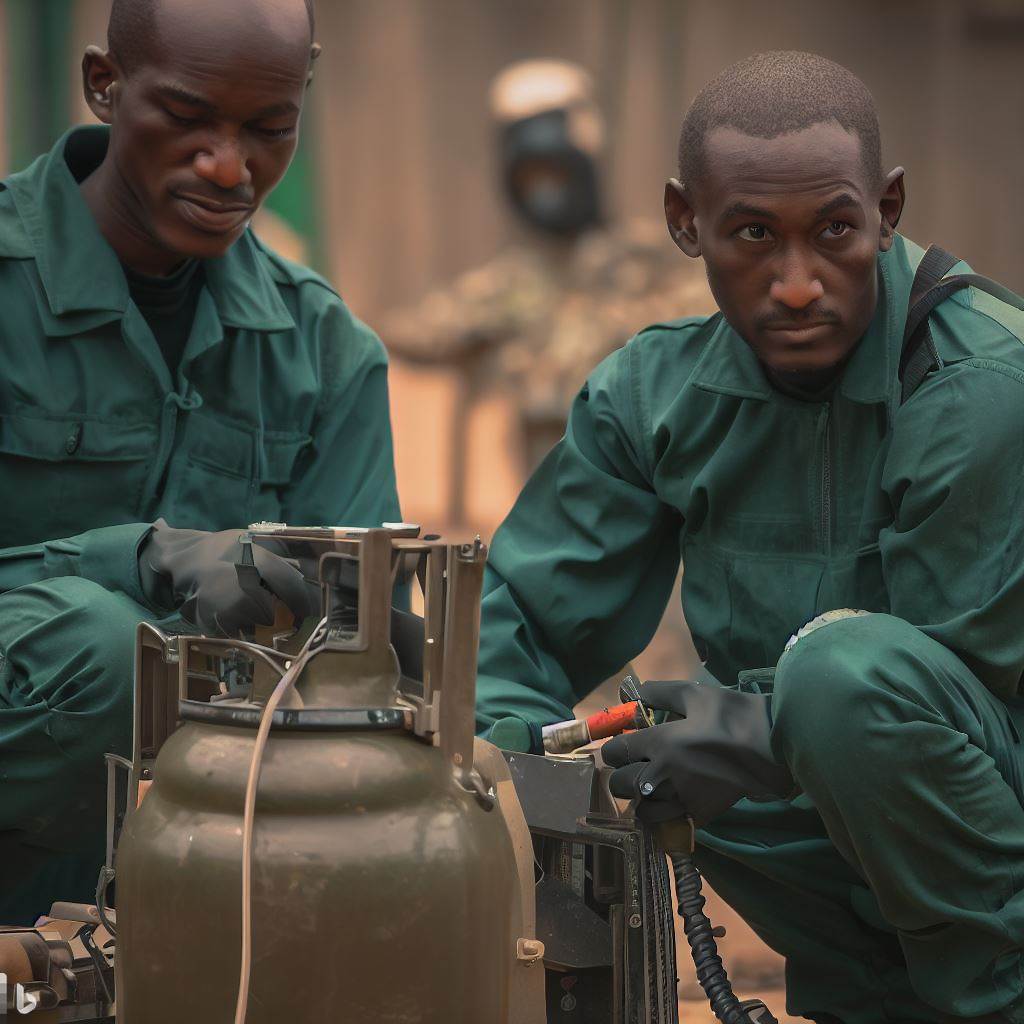Introduction
In Nigeria, bomb disposal plays a crucial role in ensuring the safety and security of its citizens. Bomb disposal is essential in Nigeria to prevent terrorist attacks, save lives, and protect infrastructure.
The humanitarian aspect of bomb disposal in Nigeria focuses on minimizing civilian casualties and providing relief during emergencies.
It is significant as it helps to maintain peace, stability, and protects human rights in the country.
By safely neutralizing explosives, bomb disposal teams contribute to the well-being and resilience of Nigerian communities.
They also assist in post-blast investigations, which aid in gathering evidence and bringing perpetrators to justice.
Furthermore, bomb disposal units provide training and support to other security agencies, strengthening the overall security apparatus.
Their work demonstrates Nigeria’s commitment to international humanitarian law and its responsibility to protect its citizens.
The significance of bomb disposal extends beyond immediate security concerns, fostering trust and confidence among the population.
The humanitarian role of bomb disposal in Nigeria is vital for protecting lives, maintaining stability, and upholding human rights.
Through their expertise and dedication, bomb disposal teams contribute to national security and ensure the well-being of Nigerian communities.
History of bomb disposal in Nigeria
Overview of the origins and development of bomb disposal in the country
In Nigeria, the history of bomb disposal dates back to the early 1970s.
Initially, the Nigerian military relied on assistance from foreign experts to handle explosive devices.
However, recognizing the need for a domestic bomb disposal unit, the Nigerian government established the Police Explosive Ordinance Department (EOD).
The EOD was tasked with building the necessary capacities and expertise to handle bomb threats and explosive devices within the country.
Challenges faced in the early stages and how they were overcome
Starting from scratch, the early stages of bomb disposal in Nigeria were challenging.
There were limited resources, inadequate training facilities, and a lack of local expertise in the field.
Despite these obstacles, the EOD persevered and worked closely with international partners to develop their capabilities.
Training programs were established, bringing in experts from various countries to teach Nigerian personnel the intricacies of bomb disposal.
In addition to training, the EOD also procured specialized equipment and developed protocols for handling different types of explosives.
Over time, the EOD grew in expertise and sophistication, and their efforts became increasingly vital in addressing security threats.
One significant turning point for bomb disposal in Nigeria was the rise of Boko Haram in the early 2000s.
The extremist group frequently used improvised explosive devices (IEDs) as their weapon of choice.
This posed a new set of challenges for the EOD, as they had to adapt their techniques and strategies to counter the evolving threat.
The EOD collaborated with the military and other security agencies to develop intelligence-led operations against bomb makers and handlers.
They also focused on public awareness campaigns to educate the population about the dangers of explosives and how to report suspicious activities.
Risks in bomb disposal operations in Nigeria
Despite these measures, bomb disposal operations in Nigeria are still fraught with risks.
Disarming explosive devices requires immense skill, precision, and bravery from EOD personnel.
They often work in hostile environments, where their lives are at stake while protecting others.
The humanitarian role of bomb disposal in Nigeria cannot be overstated.
Not only do they save lives by neutralizing explosive threats, but they also contribute to the overall safety and security of communities.
The EOD works closely with other law enforcement agencies, sharing intelligence and collaborating on counter-terrorism efforts.
Their expertise is essential in investigating bombing incidents, collecting forensic evidence, and preventing future attacks.
In fact, the history of bomb disposal in Nigeria is a testament to the dedication and resilience of the EOD.
From humble beginnings to a well-established unit, they have overcome numerous challenges to become a crucial force in ensuring the safety of Nigerians.
As threats continue to evolve, it is crucial to continue investing in training, resources, and collaboration to further enhance Nigeria’s bomb disposal capabilities.
Read: International Collaboration in Nigeria’s Bomb Disposal Field
The role of bomb disposal in saving lives
How bomb disposal units work to neutralize explosive devices safely
- Bomb disposal units play a crucial role in saving lives during dangerous situations.
- These units are trained to neutralize explosive devices safely and effectively.
- Explaining how bomb disposal units work is essential to understand the significance of their role.
- By using specialized equipment and techniques, they aim to safely remove or render explosive devices harmless.
- Bomb disposal units have experts who carefully assess the situation and devise a plan of action.
- They follow meticulous procedures to identify and disarm explosive devices without causing harm.
The impact of successful bomb disposal operations on human lives
- The impact of successful bomb disposal operations on human lives cannot be underestimated.
- By removing or neutralizing explosive devices, they prevent possible casualties and save lives.
- Countless lives have been saved due to the prompt and effective actions of bomb disposal units.
Real-life examples of instances where bomb disposal saved lives in Nigeria
- Real-life examples serve as a testament to the life-saving efforts of bomb disposal units in Nigeria.
- In a recent incident, a bomb disposal unit successfully defused a car bomb, preventing a potential tragedy.
- Their swift response and expertise saved innocent lives and ensured the safety of the surrounding area.
- During an attack on a market, a bomb disposal unit quickly identified and disabled a hidden explosive.
- Their actions averted a disaster and protected the lives of countless individuals in the vicinity.
- Another instance involved the discovery of a bomb near a crowded gathering.
- A bomb disposal unit promptly evacuated the area and safely disarmed the explosive, saving numerous lives.
These examples illustrate the critical role that bomb disposal units play in Nigeria. Without their dedicated efforts, the loss of innocent lives would be significantly higher.
By actively neutralizing explosive devices, bomb disposal units ensure the safety of the public. Their commitment and expertise have resulted in countless lives being saved.
Nigeria acknowledges the tremendous contribution of bomb disposal units and continues to support their vital work.
By neutralizing threats, bomb disposal units create a safer environment for everyone.
Read: Veterans in Bomb Disposal: A Pathway in Nigeria

Militant activities in Nigeria and the need for bomb disposal
Militant activities in Nigeria have been a recurring issue, necessitating the need for bomb disposal. The militant groups operating in Nigeria often resort to using explosives as a means to achieve their objectives.
This poses a significant threat to both civilians and critical infrastructure across the country. The role of bomb disposal units in combating these threats is paramount to ensuring public safety.
Presence of Militant Groups and their use of Explosives
- Militant groups, such as Boko Haram and Niger Delta militants, actively carry out attacks.
- These groups employ explosives as a weapon of choice in their attacks.
- Improvised Explosive Devices (IEDs) are often used, causing extensive damage and casualties.
- These explosives can be detonated through remote control devices or suicide bombings.
Threats to Civilians and Infrastructure
- The use of explosives by militants poses threats to the safety and lives of civilians.
- Explosions in crowded places, markets, and public gatherings result in significant casualties.
- Infrastructure such as government buildings, hospitals, and schools are targeted, leading to destruction.
- These attacks instill fear and disrupt the daily lives of Nigerians, hindering progress and development.
The Humanitarian Role of Bomb Disposal Units
- Bomb disposal units play a crucial role in neutralizing explosive devices and ensuring public safety.
- These units are responsible for identifying and safely disposing of IEDs and other explosive devices.
- Highly trained bomb disposal technicians employ specialized techniques to defuse and dispose of explosives.
- Their work involves risk assessments, controlled detonations, and post-blast investigations.
- Their prompt response and expertise save lives, minimize damage, and instill confidence in the population.
Combating Threats and Ensuring Public Safety
- Bomb disposal units work closely with security agencies to gather intelligence and prevent attacks proactively.
- Regular training, equipment upgrades, and knowledge sharing are essential to staying ahead of evolving threats.
- Collaboration with international partners enhances Nigeria’s bomb disposal capabilities.
- Public awareness campaigns educate citizens on identifying and reporting suspicious packages or activities.
- By neutralizing explosive devices and safeguarding communities, bomb disposal units contribute to peace and stability.
In general, the ongoing militant activities in Nigeria have heightened the need for effective bomb disposal units.
These units play a vital role in countering the threats posed by militant groups using explosives.
By ensuring public safety, neutralizing explosive devices, and collaborating with security agencies, these units contribute to safeguarding lives and critical infrastructure in Nigeria.
Read: Career Growth and Opportunities in Bomb Disposal in Nigeria
Humanitarian efforts in bomb disposal
Bomb disposal units play a crucial role in providing assistance during humanitarian crises. They are often called upon to safely remove and dispose of explosive devices in affected areas.
These units work tirelessly to protect civilians and minimize the impact of bomb threats.
The role of bomb disposal units in post-conflict reconstruction
- After a conflict, bomb disposal units assist in clearing explosive remnants of war.
- They ensure that communities can safely return to their homes and rebuild.
- By clearing landmines and unexploded ordnance, these units pave the way for reconstruction efforts.
The importance of bomb disposal for community safety and well-being
- Bomb disposal units safeguard communities from the constant threat of explosive devices.
- They prevent accidents, injuries, and fatalities by neutralizing these dangerous weapons.
- Their efforts contribute to creating a safe environment for people to live, work, and thrive.
- Furthermore, bomb disposal units provide training and raise awareness about explosive hazards.
- This education empowers communities to identify and report suspicious objects, enhancing overall safety.
In short, bomb disposal units hold a critical humanitarian role in Nigeria. They play a key part in providing assistance during crises by removing and disposing of explosive devices.
Their involvement in post-conflict reconstruction is instrumental in ensuring the safety and well-being of communities.
The importance of bomb disposal cannot be overstated, as it protects civilians, minimizes risks, and creates a secure environment for development and growth.
Read: Legal Requirements for Bomb Technicians in Nigeria
Training and equipment for bomb disposal units in Nigeria
Training Programs and Qualifications for Bomb Disposal Specialists
- Bomb disposal specialists in Nigeria undergo rigorous training programs to acquire essential skills.
- These programs include theoretical knowledge as well as practical exercises to develop hands-on expertise.
- Qualifications for bomb disposal specialists in Nigeria often include a technical or engineering background.
- Proficiency in explosives handling, risk assessment, and decision-making under pressure is crucial.
- Extensive physical fitness and psychological evaluation ensure individuals are prepared for the demanding nature of their work.
The Importance of Ongoing Training to Keep Up with Evolving Threats
- As threats and techniques utilized by terrorist organizations evolve, bomb disposal units must adapt and stay ahead.
- Ongoing training programs allow specialists to learn and implement new technologies and techniques.
- Regular exercises and drills ensure proficiency and proficiency in handling different types of explosive devices.
- Continuous training promotes teamwork, communication, and coordination between different units and agencies.
- It also facilitates information sharing and knowledge exchange among bomb disposal specialists.
The Need for Adequate Equipment and Resources for Bomb Disposal Units
- Adequate equipment and resources are vital for bomb disposal units to safely neutralize explosive devices.
- Bomb suits, bomb blankets, and specialized robots are essential to protect specialists during disposal operations.
- An array of tools, such as X-ray machines, bomb containment vessels, and remote-controlled devices, aid in diagnostics and identification.
- Proper transportation and storage facilities for explosive materials guarantee safety during handling and disposal.
- Funding from the Nigerian government is imperative to ensure bomb disposal units have access to necessary resources.
In a nutshell, the humanitarian role of bomb disposal units in Nigeria is crucial for maintaining national security and safeguarding lives.
The training and equipment provided to bomb disposal specialists are essential in equipping them to handle evolving threats effectively.
Continuous training programs help specialists stay ahead, while adequate resources and equipment ensure safe disposal operations.
Investing in the training and equipping of bomb disposal units is essential to combat the ever-present threat of explosives in Nigeria.
Conclusion
The humanitarian role of bomb disposal in Nigeria is crucial for ensuring the safety and security of its citizens. The efforts of bomb disposal units should not be overlooked or underestimated.
Recapping the humanitarian role of bomb disposal in Nigeria, it involves identifying and neutralizing explosive devices, thereby preventing potential harm and loss of life.
It is essential to recognize and support the selfless actions of these units, as they put their lives at risk to protect others from the devastating effects of bombings.
Therefore, it is of utmost importance for the government and society to provide continuous support and resources to bomb disposal units, including adequate training, equipment, and infrastructure.
By investing in bomb disposal infrastructure, such as specialized equipment and facilities, Nigeria can enhance its ability to respond effectively to bomb threats and protect its populace.
A call to action is needed to encourage further support and investment in bomb disposal units in Nigeria.
This includes financial assistance, technological advancements, and collaboration with international institutions in sharing expertise and best practices.
Together, we can ensure a safer future for Nigeria by strengthening the humanitarian role of bomb disposal and safeguarding the lives of its people.




